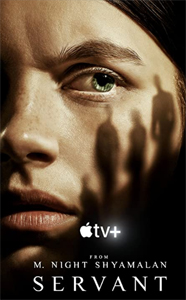With “Servant” three episodes into Season 3 on Apple TV Plus, it’s a good time to look back at the first two seasons and ask if M. Night Shyamalan’s skill set might play better on TV than in film. Shyamalan is controversial for an unusually straightforward reason in this era when people are more concerned with Hollywood folks’ personal lives: It’s about his body of work.
Film fans get into heated debates about whether he’s a great or awful filmmaker, most recently with “Old,” which received a critical split decision. I’ve had the debate internally. It seems impossible that the same person directed both “The Sixth Sense” and “The Last Airbender.”
But a less talked-about aspect of Shyamalan’s career is his compelling TV work, as an executive producer of “Wayward Pines” (2015-16) and now “Servant” (2019-present), an engagingly weird mix of dark psychological moments with borderline-goofball humor.

“Servant” Season 1 (2019-20) and Season 2 (2021)
10 episodes per season, Apple TV Plus
Showrunners: Tony Basgallop, M. Night Shyamalan
Stars: Lauren Ambrose, Toby Kebbell, Nell Tiger Free
Unlike network TV’s “Pines,” the streaming “Servant” can customize its episode lengths. Averaging about 30 minutes, each is a tasty short film, especially in the mood-oriented Season 1. The narrative remains weird in Season 2, but it unspools more conventionally.
Basgallop at the reins
In the first two seasons, Shyamalan directs three shows: “Reborn” (episode 1), “Jericho” (9) and “2:00” (14). As an EP, he hired the directing staff, ranging from veterans to his daughter Ishana Night Shyamalan, who helms the excellent Season 2 finale, “Josephine,” featuring a dark-veiled specter stalking our leads.
It should be noted that Shyamalan likely hand-picked the three most pivotal scripts for himself, but since he nails them, I can’t begrudge him.
He hasn’t written a single teleplay, though. Rather, Tony Basgallop (later seasons of “24”) writes all 10 episodes of Season 1 and seven out of 10 in Season 2. His storytelling perfectly lines up with Shyamalan’s sensibilities.
The fact that Shyamalan isn’t writing scripts won’t bother too many people since it’s regarded as his weakest trait. But even in this regard, he’s a cipher. “The Sixth Sense” is masterfully written. “Airbender” is horribly directed. “The Happening’s” screenplay is no one’s masterpiece, but it might’ve been saved with better direction of actors.
“Servant” is moody psychological horror in Shyamalan’s wheelhouse, starting with the string and bell music of the credits. A door peeks open and a baby smiles over an adult’s shoulder. “SERVANT” appears in big letters like in old scare movies. In the show itself, composer Trevor Gureckis laces crucial moments with brass clanks and off-key strings, and baby-monitor static joins the sound mix.

Drama in a brownstone
In a four-story Philly brownstone where we see every nook and cranny, newscaster Dorothy (Lauren Ambrose) balances high-profile work and high-stress motherhood. Husband Sean (Toby Kebbell) is a chef whose work-from-home business slides nicely into these pandemic times and “Servant’s” theme of work-home balance.
Kebbell’s best scenes are shared with fellow Brit Rupert Grint (“Harry Potter”) as wine-drunk brother-in-law Julian. The actors smother their accents as their characters brusquely and humorously argue about the latest wrinkle in their situation.
Nanny Leanne (the quietly magnetic Nell Tiger Free) is the title character. But baby Jericho is arguably the focal figure …
(SPOILER WARNING.)
… even though when we say “Jericho” we could be referring to human Jericho No. 1, a doll, or human Jericho No. 2. A doll is replaced with a baby at the end of episode one as “Servant” launches its early identity as a show where we often say “What the hell?!”
Basgallop writes a reframing twist into the first eight episodes, mostly involving the nanny. Leanne prepares a dish of eel (you start by pounding the animal to death on the counter), flogs herself, and pops in a DVD of herself and Dorothy in an old TV interview that Dorothy surely forgot.
A twist every 30 minutes
Despite coming from Basgallop’s keyboard, the twists make me associate “Servant” with Shyamalan. Notably, “Rain” (6) has serious vibes of “The Visit” – that horror riff about two off-kilter grandparents — when Leanne’s Uncle George (Boris McGiver) stays the night. Julian finds the uncle curled up in the crib, the baby having been placed on the floor. It’s quite an image; I laughed out loud at the shock of it.
And then there’s “Jericho,” one of the best TV episodes of 2020, driven by Night’s direction and a masterful turn by Ambrose, in her first series since the “X-Files” revival. One particular shot sticks with me. Faraway, through the nursery doorway, we see a cribside Dorothy shaking in an inhuman manner as her brain processes horrific information: She left Jericho in the car hours earlier on this hot day.
The episode calls to mind “Buffy’s” “The Body” in the way the situations and emotions are harshly real. But it’s not as unblinking as “The Body”: Basgallop and Shyamalan intersperse flashbacks and current action without fade-outs or gauzy lighting, since Leanne’s presence tells us when it’s current day.
I can’t complain about the relieving cutaways, because what Dorothy goes through comes from every parent’s nightmare.
More Night moves
Shyamalan makes another great “short film” out of “2:00,” wherein Dorothy keeps Leanne in the attic, hoping she’ll reveal information about the missing Jericho. Here, “Servant” drives home its symbolism of dolls and manikins. Horror tradition tells us to expect Leanne to jump out of the shadows from behind an attic visitor, but she instead stands quietly among the clothes racks, like she herself is a manikin.
And adding to the baby theme, Julian has childhood issues such that he sometimes reverts to infancy. Girlfriend Natalie (Jerrika Hinton) knows the way to his heart is to act motherly.
I go against the critical grain by liking Season 1 more than 2. After the heart-in-your-throat chills of “Jericho,” Basgallop switches from question mode to answer mode starting with “Balloon” (10). The downside is that this is the first predictable story of the series.
While religious cults can be scary (see “Midsommar”), the one that raised Leanne is relatively benign, at least when embodied by Uncle George, who is troubled but rather sweet. Season 2 is eventually about answers – but not right away. Shyamalan’s “2:00” is artistic, but it’s not as essential to the bigger puzzle as “Reborn” and “Jericho.”
Absurdity meets artistry
There’s a plot hole early in Season 2. We learn that the police responded to Jericho’s death, yet Dorothy’s employer does not know her baby died. In real life, a news station would know via the daily gathering of police reports. For this, I wag my finger at “Servant,” but it’s not enough to make me abandon it.
Interestingly, as “Servant” shifts from questions to answers, it has perhaps left Basgallop’s comfort zone. In Season 2, Basgallop brings on Nina Braddock as a primary cowriter, and he only pens one of the last four eps.
“Josephine” (20), written and directed by Ishana, makes it clear that supernatural elements will reign in Season 3. Resurrections and the price of dark powers are standard horror themes.
Still, “Servant” has already accomplished a feat of mixing two tones that presumably should not mix. It can go into “Simpsons” territory, like when Uncle George moans out “Leanne!” while Dorothy, Shaun and Julian try to hide his presence from a snooping police detective and Shaun explains “The house is settling.”
Yet “Servant” can be almost painfully artistic, especially when helmed by Shyamalan (who also directs January’s Season 3 premiere, “Donkey”). It’s all of a piece – a piece of Shyamalan’s resume that shouldn’t be overlooked.
Click here to visit our Horror Zone.
Season 1: 4.5 stars
Season 2: 4 stars

